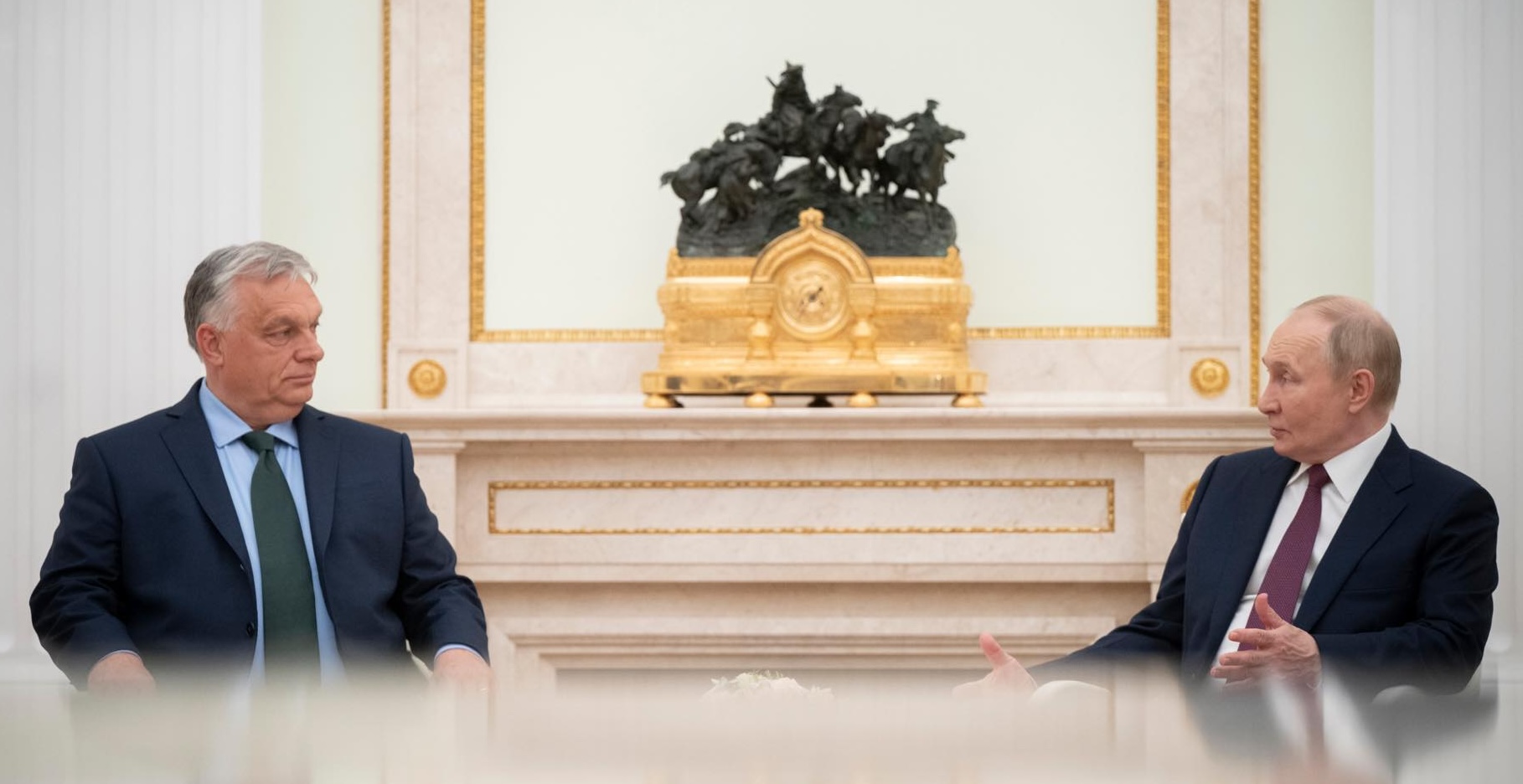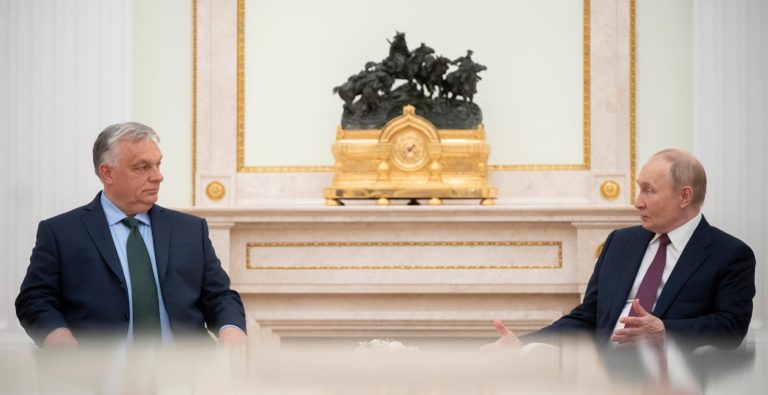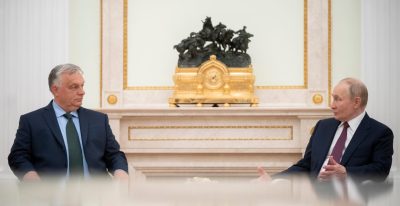Hungary’s government and its EU presidency, which began on Monday, did not officially inform EU and NATO allies about Prime Minister Viktor Orbán’s plans to meet with Russian President Vladimir Putin on Friday. This was confirmed to VSquare by multiple European government officials and diplomats stationed in Budapest.
VSquare first broke the news on the author’s X/Twitter account, from which many countries learned about Orbán’s upcoming meeting with Putin.
‼️🇷🇺Tomorrow, Viktor Orbán is expected to travel to Moscow, just days after he paid a surprise visit to Kyiv on Tuesday, multiple Western and CEE officials independently told me. Foreign minister Péter Szijjártó (Lavrov’s buddy) goes too. What a start to @HU24EU! @VSquare_Project pic.twitter.com/dP75HC8t6X
— Szabolcs Panyi (@panyiszabolcs) July 4, 2024
Allies kept in the dark
Most NATO and EU allies were caught off guard, and the secretive organization of the Moscow visit infuriated many, European officials told VSquare. There was no prior communication with the foreign ministries of EU member states or the current senior EU leadership. Major non-EU NATO allies like the United States and the United Kingdom were also not officially informed. On the other hand, senior leaders of NATO knew about the visit, NATO Secretary General Jens Stoltenberg told at a press conference on Friday.
“We are shocked, especially after Orbán’s visit to Kyiv, which had suggested that things were moving in a positive direction,” said an official working for a European country’s embassy in Budapest.
Even after the news broke and EU officials sought confirmation from Hungarian counterparts, communication failed. For instance, on Thursday evening, the staff of European Council President Charles Michel shared background information with journalists, indicating that multiple attempts to establish contact and confirm Orbán’s possible visit to Russia were unsuccessful. They noted that if Orbán had asked, President Michel would have strongly advised against such a visit.
This statement followed Michel’s tweet, which, without naming Orbán, asserted that “the EU rotating presidency has no mandate to engage with Russia on behalf of the EU. The European Council is clear: Russia is the aggressor, Ukraine is the victim. No discussions about Ukraine can take place without Ukraine.”
VSquare’s initial scoop about Orbán’s meeting with Putin was confirmed by three independent sources identified as Western and Central Eastern European officials. Two of them further noted that their knowledge of the visit also did not come from any official communication with Hungarian counterparts.
“Completely against the norms”
The story was subsequently confirmed by outlets such as Radio Free Europe, the Financial Times, and the Guardian, citing both EU officials and Hungarian government sources. A source close to the Hungarian government told the Guardian that Orbán’s team had planned the Moscow trip before his meeting with Volodymyr Zelensky, contradicting speculation that the visit was organized at the last minute or after Orbán’s trip to Ukraine.
European officials talking to VSquare expressed dismay over the Hungarian Prime Minister and the Hungarian EU presidency’s behavior, one suggesting that “it goes completely against the norms of how diplomacy is conducted between allies”, and “we now see it was a clear intention to hide Orbán’s plans from us so that we would not be able to push back and potentially prevent this controversial meeting from happening.”
Another European official criticized the Hungarian government for deceiving the public. Earlier on Thursday, Orbán’s press chief Bertalan Havasi had issued a statement claiming that Orbán would attend the summit of the Organization of Turkic States in Shusha, Azerbaijan, without mentioning the stopover in Moscow. Given the more newsworthy Kremlin visit, this was seen as an attempt to mislead the public.
The frustration with Orbán was particularly evident in the comments made by Polish Prime Minister Donald Tusk on X/Twitter.
PM Orbán on his way to Moscow: “We will serve as an important tool in making the first step towards peace”. The question is in whose hands this tool is.
— Donald Tusk (@donaldtusk) July 5, 2024
Hungary’s government refused to confirm or deny Orbán’s visit until he arrived in Moscow late Friday morning.
Before the meeting, many heads of EU governments, along with the EU’s high representative, emphasized that Orbán was not authorized to represent the EU in his meeting with Putin and could only speak on behalf of Hungary.
An official working for a European country’s Budapest embassy told VSquare that the real concern was how Putin might exploit this opportunity and what he might say at the press conference alongside Orbán.
These fears were validated when Putin, standing next to Orbán, predictably stated right at the beginning of their meeting, “I understand that you came here not only as our partner but also as a representative of the EU Presidency.”
First Putin, then Trump?
While the Orbán government and the Hungarian EU presidency do not seem to be coordinating closely with EU institutions and NATO, there are indications of backchannel communications with former U.S. President Donald Trump and his team. “Important: PM Orbán is not traveling to Moscow as an EU envoy but as de facto Trump’s envoy,” Milan Nic, a senior fellow at the German Council on Foreign Relations, a well–connected expert on Central Europe, tweeted in reaction to the news.
A source connected to the Hungarian government also confirmed to VSquare that Orbán is trying to position himself as an intermediary between anti-Ukrainian U.S. Republicans and Russia. This is seen more as an expectation or likely scenario rather than a clearly set plan, but there are more engagements expected between Hungarian officials and the Trump team during Hungary’s EU presidency, the source added.
Lower-level talks are already occurring. For instance, next week, during the NATO Summit in Washington DC, foreign policy advisers and analysts working for the Hungarian PM will attend a closed-door meeting at the Heritage Institute, based on a leaked invitation email I posted on X/Twitter. Heritage is a pro-Trump think tank currently drafting the policy agenda and vetting future members of a potential Trump administration through its Project 2025 presidential transition agenda.
💥SCOOP: Heritage, the influential pro-Trump think-tank (which is already vetting staffers for a new administration) is welcoming Orbán’s foreign policy analysts and advisors next week.
Here’s some more on how Visegrád countries are bracing for Trump 2.0: https://t.co/3QZcUWs3pD pic.twitter.com/ohVGfseeA2
— Szabolcs Panyi (@panyiszabolcs) July 3, 2024
“Make Europe Great Again,” the Trump-ripoff slogan of the Hungarian EU presidency, is also not just simple trolling but part of a larger strategy, as I wrote in VSquare’s latest Goulash newsletter:
“According to multiple Hungarian government sources and a diplomat from an EU country, Hungarian Prime Minister Viktor Orbán actually aims to get Trump to appear at the most significant event during Hungary’s EU presidency: a European Political Community and an informal EU Summit currently scheduled for November 7-8 in Budapest. The diplomat of an EU country further suggested that Orbán might have already extended an invitation to Trump during their meeting in Florida in March. However, Trump’s well-documented aversion to long-haul travel, combined with the tight timing between the November 5 U.S. presidential election and the Budapest event, makes an in-person appearance almost impossible. As with previous CPAC Hungary events, it is more plausible that Trump would opt to send a short video message – or appear virtually – rather than attend the summit in person… Donald Trump’s virtual participation in even an informal gathering of EU leaders would be unprecedented and extremely disruptive, challenge established diplomatic norms and create tension both within the EU and with the Biden administration. ”
Cover illustration: Viktor Orbán’s official Facebook page
Subscribe to Goulash, our original VSquare newsletter that delivers the best investigative journalism from Central Europe straight to your inbox!
VSquare’s Budapest-based lead investigative editor in charge of Central European investigations, Szabolcs Panyi is also a Hungarian investigative journalist at Direkt36. He covers national security, foreign policy, and Russian and Chinese influence. He was a European Press Prize finalist in 2018 and 2021.







